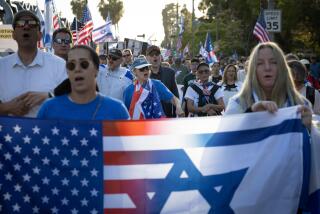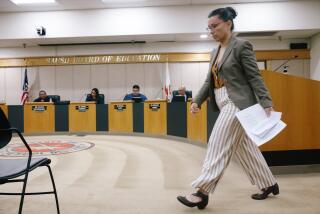L.A.-Area Seminary Teachers Gather to Ponder the Truth
- Share via
About 40 seminary faculty members from Catholic, Jewish and Protestant theological schools gathered in Encino recently to spend hours defining and discussing religious truth.
Fireworks? No, not even a few firecrackers.
Noting the “very civilized exchange” last year and at this winter’s fourth annual gathering of seminary faculty and guests from five Southern California seminaries, moderator Donald E. Miller, a USC expert in the sociology of religion, said what most participants have known for years:
There is more similarity of religious views among what Miller called “progressive” Jews, Catholics and Protestants than there is between orthodox and progressive believers within each faith.
Jewish participants alluded to bitter conflicts between Orthodox Judaism and the religion’s relatively liberal branches. One seminary professor referred to “internecine warfare in evangelical [Christian] circles.” A few Catholic professors mentioned new groups of “fundamentalists” challenging all but the most conservative priests and bishops.
The five institutions brought together by the Skirball Institute on American Values are the Los Angeles Catholic Archdiocese’s St. John’s Seminary in Camarillo, Reform Judaism’s Hebrew Union College, the Conservative-related University of Judaism, the evangelical Fuller Theological Seminary in Pasadena and the Claremont School of Theology, a United Methodist-run ecumenical facility.
Eugene Mornell, executive director of the Skirball Institute, said that Biola University’s Talbot School of Theology had been invited the past two years but could not make it.
Miller ended discussions Friday at the Holy Spirit Retreat Center by asking whether “the orthodox camp,” which he did not identify, should be invited to next year’s conference.
“This could have value because it would immediately sharpen our discussion of revelation, reason, tradition and experience,” Miller said.
“The downside? Probably there wouldn’t be another conference,” he quipped, evoking laughter from the professors.
A successful student version of Christian-Jewish discussions by the same quintet of Southland seminaries has been running since 1971. Some seminarians from the five schools attend a 24-hour retreat each year above Malibu at the Gindling Hilltop Camp operated by Wilshire Boulevard Temple.
Sponsored by the organization formerly known as the National Conference of Christians and Jews, the 1998 InterSem conference for students last month drew 77 participants, including some faculty and administrators.
The faculty discussions in Encino also got around to how seminarians handle claims of truth.
Rabbi Daniel Gordis, dean of the Ziegler School of Rabbinic Studies at the University of Judaism, said Jewish seminarians 10 years ago wondered what was possible to say about religious truth “amid the debunking of classic truths” in intellectual circles.
“Today, that question hasn’t been resolved, but they are not consumed by it,” Gordis said. “The critical question for them now is [the application of] Jewish law--what to wear, how to act, who to marry, and so on.”
The practical-minded seminarian has also been observed by Lori Anne Ferrell at the Claremont School of Theology. “They see themselves as ‘answer people in training’ for when they get out,” she said.
Claremont colleague Kathleen Greider said she sees two kinds of students: “Those who are looking for the truth and those who came because they found the truth.” Seminaries are “trying to teach them all the same way, and it hasn’t been working,” she said.
(BEGIN TEXT OF INFOBOX / INFOGRAPHIC)
Voices
Some observations about truth at the fourth annual conference on seminary education at the Holy Spirit Retreat Center in Encino:
On the Catholic tradition of supernatural truths often described as divine mysteries:
“I’ve become humbled over the years to realize how little of truth I know. One thing I find helpful is not to say what mystery is, but to protect it.”
--Patrick Mitchell
St. John’s Seminary
On finding truth in the Bible:
“The Decalogue [Ten Commandments] doesn’t address me--[as a woman] I’m part of the livestock. I have to look at where the Decalogue points. . . . It’s not that Scripture is inerrant but is inexhaustible.”
--Rachel Adler
Hebrew Union College
On Truth as the seeker:
“I have to say that God is Truth and addresses us. That we have a truth or the truth is less important than [that] it has sought us.”
--Paul Ford
St. John’s Seminary
More to Read
Sign up for Essential California
The most important California stories and recommendations in your inbox every morning.
You may occasionally receive promotional content from the Los Angeles Times.













